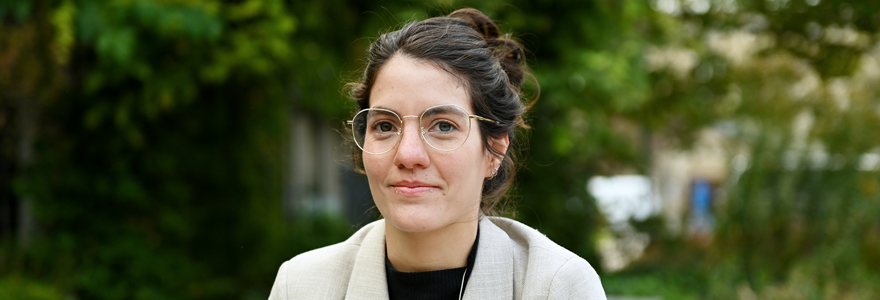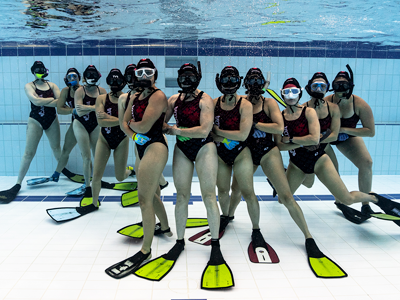Diving into science and sport: Laura Muñoz Baena, PhD’23
 New graduate Laura Muñoz Baena says sharing and communicating her research was a highlight of her PhD studies. (Emily Leighton/Schulich Medicine & Dentistry)
New graduate Laura Muñoz Baena says sharing and communicating her research was a highlight of her PhD studies. (Emily Leighton/Schulich Medicine & Dentistry)
By Cree Harding
Laura Muñoz Baena wasn’t a strong swimmer when she discovered the world of underwater hockey, but she was intrigued by the unique sport.
To play underwater hockey, which involves maneuvering a weighted puck along the bottom of a swimming pool, she had to learn how to swim with fins, use a snorkel, and hold her breath for long periods of time – all under six to 13 feet of water.
She put her determination to work to meet this ambitious goal – a characteristic that has served her well as an athlete and PhD candidate with the Department of Microbiology and Immunology at Schulich Medicine & Dentistry.
Nine years after being first introduced to underwater hockey, Muñoz Baena now plays for Canada’s national team, most recently representing the country at the World Championships in Australia.
As she receives her doctoral degree this week, Muñoz Baena discusses what keeps her motivated and passionate in this Convocation Q&A.
What initially sparked your interest in bioinformatics and virus evolution and led you to pursue this specialized area of study?
My interest was sparked during my studies in biological engineering in Colombia. I worked in a lab that required a very organized, systematic, and careful handling of biological samples. When coding was introduced to the work, even though it was a learning curve, I felt more confident. Expensive reagents or unique RNA samples wouldn’t be lost if my experiments failed, so I decided that I wanted to use bioinformatics to facilitate my exploration of the ever-changing natural world.
When I decided this was the area I wanted to pursue, I found my current supervisor Art Poon, PhD, whose research lab aligns with my interests in bioinformatics and virus evolution.
Can you share a memorable moment from your journey at Schulich Medicine & Dentistry that had an influence on your perspective or career goals?
To me, science represents the greatest cooperative effort of humanity. As a result, the things that I've enjoyed the most have involved sharing and communicating my work.
A big part of my experience as a graduate student was working as a Teaching Assistant (TA) for my supervisor. It was intimidating at first, but when the students started to grasp the complex topics I was explaining, it was incredibly rewarding.
I also noticed an improvement when I expressed my care for the students and stared sharing my fascination for the class topics with them. In the end, I felt my own knowledge benefitted from the progress the students made.
Now that you've completed your PhD, are there specific roles or projects you're excited about pursuing in your career?
I will say that finishing my PhD is a little scary. After five years focusing on my research – it feels like it's my entire world, so as it comes to an end, it is nerve-racking. Even though academia is a hard area to work in, I would love to continue doing scientific research, wherever that takes me.
 The Canadian women's underwater hockey team recently competed at the World Championships in Australia. (supplied photo)
The Canadian women's underwater hockey team recently competed at the World Championships in Australia. (supplied photo)
You’re involved in underwater hockey at a national level. What's the story behind how you got introduced to and pursued this unique sport?
I started playing underwater hockey in Colombia back in 2014 when a friend introduced me to the sport, but first I had to get much better at swimming. Once I got the hang of it, it was a lot of fun. I started to improve and wanted to play more and more.
It was hard when I came to Canada and couldn’t play for a couple of years due to the pandemic and the long distances. Eventually, I found a club in Hamilton – a friendly, tight-knit group of underwater hockey players who allowed me to join. I've been playing ever since.
How did you manage to successfully balance school and sport? Any advice for people who are trying to pursue their passions outside academia?
Routine is essential. It gets easier when you are used to it, and your body remembers what to do and when to do it. During my PhD studies, I made a conscious effort to prioritize non-academic activities that are important to me as well. For example, I know that I start to feel down and less focused if I don’t take the time to practice sports with my friends, so I incorporated underwater hockey as part of my routine.
However, at the end of the program balancing studies with other life aspects can get really complicated. Since you probably won't be able to do everything, it is necessary to choose what you value the most. Luckily for me, I have amazing friends and family that kept me accountable and reminded me to take one day at the time to enjoy the process.
How did mentorship play a role in your experience as a PhD candidate?
I was lucky enough to find a supervisor who I clicked with, as it needs to be a trusting, honest and transparent relationship.
In Art, I was fortunate to find an amazing mentor, who was very hands-on and provided any feedback and support necessary. This support had an extremely positive impact on my experience and research.
As a new PhD graduate, what advice do you have for aspiring students interested in pursuing a similar path in microbiology and immunology?
I have a few pieces of advice!
For starters, I recommend picking a topic that you are curious about and that you can do for a long period of time. Choosing your PhD is a long-term commitment, so it becomes easier and enjoyable if you truly care about your research.
Another tip is to remind yourself that it is key to keep engaging with others. Never let your research isolate you. You are not alone, and you grow as you share your experience. Even though school may feel like your whole life, it's just a part of it, and you must continue living your life outside of school in order to stay healthy and happy.








